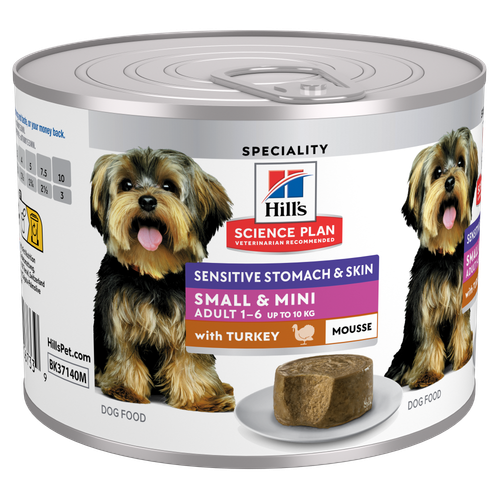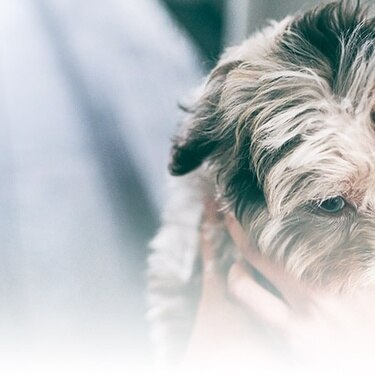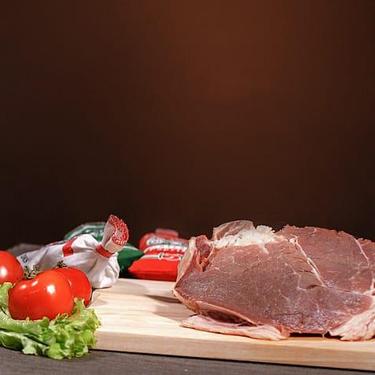
-
Find the right food for your petTake this quiz to see which food may be the best for your furry friend.Find the right food for your petTake this quiz to see which food may be the best for your furry friend.Featured products
 Mature Adult Dog Food
Mature Adult Dog FoodHill's Science Plan Mature Adult Multipack Wet Dog Food with Chicken & Beef are complete premium pet foods for mature adult dogs from 7 years. Your dog will love these deliciously smooth and savoury minced loaves, formulated to deliver the appropriate amount of energy to support the needs of adult dogs.
Shop Now Puppy Food
Puppy FoodHill's Science Plan Puppy Multipack Wet Dog Food with Chicken & Beef are complete premium pet foods for growing puppies from weaning until 1 year old and for pregnant and nursing dogs. Your puppy will love these deliciously smooth and savoury minced loaves, formulated for balanced nutrition and overall health.
Shop Now Adult Wet Dog Food with Beef
Adult Wet Dog Food with BeefHill's Science Plan Adult Multipack Wet Dog Food with Chicken, Beef & Turkey are complete premium pet foods for adult dogs from 1 year. Your dog will love these deliciously smooth and savoury minced loaves, formulated for balanced nutrition and overall health.
Shop NowFeatured products Adult Multipack Wet Cat Food with Beef, Ocean Fish & Chicken
Adult Multipack Wet Cat Food with Beef, Ocean Fish & ChickenTender chunks in gravy for cats, with high-quality protein to maintain lean muscle. With vitamin E and omega-3s & -6s for healthy skin and balanced minerals to support healthy vital organs.
Shop Now Light Adult Multipack Wet Cat Food with Chicken & Ocean Fish
Light Adult Multipack Wet Cat Food with Chicken & Ocean FishTender chicken chunks in gravy for cats, with L-carnitine and fewer calories for ideal weight management. Packed with high-quality protein, omega-6s, and vitamin E for shiny fur and healthy skin.
Shop Now Mature Adult Wet Cat Food with Chicken
Mature Adult Wet Cat Food with Chicken
Tender chicken chunks in gravy for mature adult cats. Made with easy-to-digest ingredients, high-quality protein for lean muscle maintenance and antioxidant vitamins C+E for optimal health.
Shop Now -
Dog
- Dog Tips & Articles
-
Health Category
- Weight
- Food & Environmental Sensitivities
- Urinary
- Digestive
- Joint
- Kidney
-
Life Stage
- Puppy Nutrition
- Adult Nutrition
- Senior Nutrition
Cat- Cat Tips & Articles
-
Health Category
- Weight
- Skin & Food Sensitivities
- Urinary
- Digestive
- Kidney
-
Life Stage
- Kitten Nutrition
- Adult Nutrition
Featured articles The Right Diet For Your Pet
The Right Diet For Your PetIn people, the right diet is very important. If you are eating the wrong way for your metabolism, activity level, age and lifestyle you could end up with health issues.
Read More The Incredible Science Behind Your Pet's Microbiome
The Incredible Science Behind Your Pet's MicrobiomeLearn what your pet's microbiome is, how it contributes to your pet's gut and overall health, and why nutrition is important in maintaining healthy microbiomes.
Read More Show some love with wet foods: a great choice for pets with health issues
Show some love with wet foods: a great choice for pets with health issuesShow some love with wet foods: a great choice for pets with health issues.
Read More -


Before getting into what to feed your small senior dog, we should clarify what we mean by a small senior dog. Small dog breeds tend to be those that weigh no more than around 12-15kg as adults. Exactly when a dog is considered senior depends a little on their size. Small dogs, in general, live longer than their larger and giant canine counterparts. So while a Labrador, for example, might be considered senior at age seven, a small dog like a Jack Russell terrier probably wouldn’t be considered senior until nine to ten years of age.
If you want to know all about feeding small dogs in general and how they differ from larger breeds, you can read all about it here. In summary, small breeds:
Have faster metabolisms, so they need more calories per kilo of body weight.
Mature faster than large breeds, so they need a slightly different mineral balance.
Have smaller mouths, so they need smaller kibble.
May be more easily stressed than larger breeds, so they may benefit from a food with anxiety-lowering natural ingredients.
Live longer, so they benefit from extra antioxidants to help fight wear and tear and cell ageing.
Why do senior dogs need to be fed differently from adults?
As dogs age, just like us humans, things start to change. They gradually become less active, body systems may start to function less efficiently, and degenerative problems such as arthritis may begin, reducing their mobility. One of the reasons that dogs are living longer and longer nowadays is excellent nutrition, and switching to a senior food when the time is right will help keep all the optimum benefits of great nutrition going throughout your dog’s life. Senior dog foods tend to have these benefits for older dogs:
Reduced calories. Older dogs, because they are less active and may have mobility issues, tend to put on weight. Being overweight is never good, but with joint issues it’s even worse, so keeping your dog slim is really important. Senior foods will still help your dog feel full but with fewer calories. The opposite can also be true, however, as dental problems and other health issues can cause pain and a lack of motivation to eat. Also, with very advanced age, dogs tend to naturally start to lose muscle mass and therefore weight. It’s important to retain a healthy weight and muscle mass, so speak to your vet about advanced nutrition to support your senior dog.


Tasty Tips
Controlled protein and minerals. Older dogs are more prone to things like heart and kidney problems because organs may start to function less efficiently. Having controlled protein and mineral levels can help take some of the workload off these organs. The protein must be high-quality and highly digestible to help maintain muscle mass.
Increased antioxidants and omega 3 fatty acids. Antioxidants help to combat cell wear and tear, while omega 3 fatty acids are anti-inflammatory and have many other benefits. Increased levels of both can also help with signs of brain ageing and cognitive dysfunction.
So, what should you feed your small senior dog?
Before you think about switching your dog’s food, always speak to your vet first and remember to make any changes to diet gradually over five to seven days. This will avoid stomach upsets caused by a sudden change.
You’ll want a food that meets the needs of both small and senior dogs. It also needs to be complete and balanced, meaning that it contains all the nutrients your dog needs in the right proportions. You can feed wet food, dry or a combination of the two, depending on your dog’s taste and your preferences. Older dogs may have diminished appetite, so you may find that feeding wet food helps stimulate their appetite.
You might also want to consider raising the food and water bowls, either by placing them on a stair or a special stand. Think about non-slip flooring, especially where your dog will be eating, as slipping can be very painful for older dogs. These changes can help dogs with arthritis eat more comfortably. Smaller, more frequent meals may also suit some senior dogs.
The good news is that there are lots of foods formulated specifically for small senior dogs so you’ll have plenty of choice and a nice variety for your senior friend. Talk to your vet about which might suit your individual dog best so that you and your dog can enjoy as many of those golden years as possible.
Reviewed by Dr. Hein Meyer, DVM, PhD, Dipl-ECVIM-CA


One of our staff authors prepared this article for you
Related products

Hill's Science Plan Perfect Digestion Small & Mini Adult Dog Food with Turkey is a complete premium pet food for small breed adult dogs aged 1–6 years. This deliciously smooth mousse is precisely balanced to deliver the appropriate amount of energy and to support digestive health in adult, small breed dogs.

Hill's Science Plan Sensitive Stomach & Skin Adult Wet Dog Food with Chicken is a complete premium dog food for adult dogs from 1 year. This savoury tinned loaf is enriched with ingredients that support digestive health & skin care.

Hill's Science Plan Sensitive Stomach and Skin Small & Mini Adult Dog Food with Turkey is a complete premium pet food for small breed adult dogs aged 1–6 years. This deliciously soft mousse is enriched with ingredients that support digestive health & skin care.

Hill's Science Plan Adult Small & Mini Dog Food with Turkey is a complete premium pet food for adult small dogs from 1 year old that are prone to weight gain or slightly overweight. This deliciously smooth mousse is formulated to deliver the appropriate amount of energy to support weight maintenance in adult dogs.
Related articles

How, when and what to feed your new puppy is an important decision, learn more about the things to consider for feeding your puppy.

Many human foods are dangerous to dogs. Read about 5 of the worst toxic food offenders that can kill your dog - and how much it takes to hurt them.

Learn effective tips for feeding a dog that's a picky eater and ensure proper nutrition for a finicky eater. Discover tips for pet parents at Hill's Pet UK.

Learn about the potential health risks of a raw diet for dogs and why they aren't the best option for your pup or you.

Put your dog on a diet without them knowing
Our low calorie formula helps you control your dog's weight. It's packed with high-quality protein for building lean muscles, and made with purposeful ingredients for a flavourful, nutritious meal. Clinically proven antioxidants, Vitamin C+E, help promote a healthy immune system.
Put your dog on a diet without them knowing
Our low calorie formula helps you control your dog's weight. It's packed with high-quality protein for building lean muscles, and made with purposeful ingredients for a flavourful, nutritious meal. Clinically proven antioxidants, Vitamin C+E, help promote a healthy immune system.

